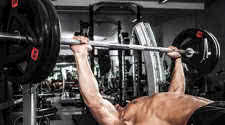Bench Press Studies: Failure Training Boost Bench Press Strength Gains

Increase and Maximize your Bench Press Potential NOW
Governor Arnold in his first mainstream movie "Stay Hungry" said, "You must burn to grow!" Is this bodybuilding bravado or
is there truth to what he said? Australian scientists found that training to repetition failure (four sets of six
repetitions) - caused greater increases in bench press strength and power than non-failure training (eight sets of three
reps) in elite junior team sport athletes.
Subjects in the repetition failure group received assistance from a spotter to complete each set (magic fingers). Improvements
in strength and power were 25 to 35 percent greater in the failure group during the six-week study. The subjects used in this
study were good athletes, but not highly experienced strength trainers, so the results may not apply to serious bodybuilders
or power athletes.
BONUS ARTICLE:
Bench Press Activates Pectorals & Deltoids Better than Flys Many bodybuilders prefer flys over bench presses because flys seem to isolate the pecs better. Truman State scientists, led by Elizabeth Welsch, found that bench presses loaded the chest and shoulder muscles better than flys. They measured the activation of the pectoralis major and anterior deltoid muscles using electromyography (EMG) during dumbbell bench press, barbell bench press and dumbbell fly exercises.EMG measures the electrical activity of skeletal muscle and is similar to the electrocardiogram (used to measure heart muscle function).They concluded that dumbbell and barbell bench presses were equally good at overloading the target muscles and that both exercises are complementary for overcoming sticking points. Flys are good as an auxiliary pec exercise, but do not activate the pecs and anterior delts as well as bench presses.